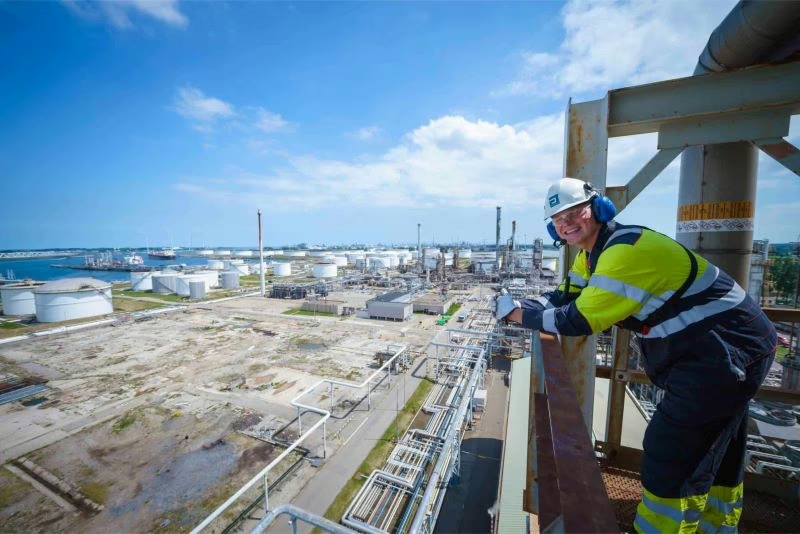
Switzerland-based Varo Energy plans to invest $600 million in construction of a large-scale sustainable aviation fuel (SAF) production facility in Rotterdam, the Netherlands.
Planned to begin production in late 2026, the plant will have the capacity to produce 245,000 metric tons (80.9 million gal.) of SAF per year.
At full capacity, Varo says, the new plant at the Gunvor Energy Rotterdam site could provide up to 7% of the fuel required to meet the EU’s mandated target for SAF to account for 5% of jet fuel consumption by 2030. The plant will produce HEFA SAF from 350,000 metric tons per year of waste fats, oils, and greases.
The plant will be a partnership between Varo and Gunvor Gorup, which acquired the Rotterdam petroleum refinery in 2016. Varo is two-thirds owned by The Carlyle Group and one-third by Swiss-based Dutch energy multinational Vitol.
Separately, process developer Lummus Technology has announced the commercial availability of a process to convert ethanol to SAF. The announcement comes as the Biden administration delays a decision on whether to make it easier for SAF made from corn-based ethanol to qualify for a blenders’ tax credit included in the Inflation Reduction Act (IRA) of 2022.
To qualify for the subsidy, the IRA says the SAF must be certified as having a lifecycle greenhouse-gas emissions reduction of at least 50% in accordance with the International Civil Aviation Organization’s Carbon Offsetting and Reduction Scheme for International Aviation (CORSIA) or “similar methodology.”
The U.S. ethanol industry wants the government to use the U.S. Energy Department’s Greenhouse Gases, Regulated Emissions and Energy Use in Technologies (GREET) model to assess lifecycle reductions. At issue is the penalty imposed by the CORSIA model for land-use changes from growing crops for energy.
Lummus’ ethanol-to-SAF process integrates dehydration technology developed by Brazil’s Braskem to convert bioethanol into green ethylene, followed by light olefin oligomerization and hydrogenation in a process that maximizes the final yield of SAF, the company says.
Braskem has operated an ethanol dehydration unit in Brazil since 2010, Lummus says, producing 260,000 metric tons per year of ethylene from ethanol. The oligomerization and hydroprocessing technologies come from joint venture Chevron Lummus Global and are also proven at scale, Lummus says.
Lummus is offering the integrated ethanol-to-SAF process for licensing to fuel producers. In October 2022, Honeywell UOP launched an ethanol-to-jet fuel processing technology that allows producers to convert corn-based, cellulosic or sugar-based ethanol to SAF. Summit Next Gen plans to use the technology in a 250 million gal.-per-year SAF plant planned for the U.S. Gulf Coast region.
